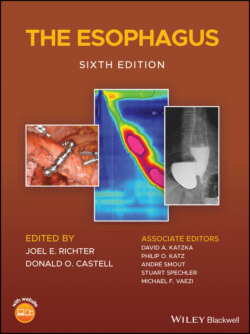Читать книгу The Esophagus - Группа авторов - Страница 54
Conclusion
ОглавлениеIn summary, there are a number of pharmacologic and nonpharmacological agents for the treatment of ECP. Current recommendations vary depending on expert opinion and prior experience, as the evidence‐based data for many therapeutic modalities is overall weak. Furthermore, emerging evidence highlights a complex pathogenesis of esophageal hypersensitivity involving pain signaling and neurogenic feedback loops, which may overlap with mental health disorders, in particular anxiety and hypervigilance. As a result, we recommend an approach that takes into consideration the frequency of patient comorbidities, in particular mental health, as well as the cost and availability of the different drug options (Figure 2.1).
Given the low cost, ease of accessibility, options for in‐class switching, frequency of mental health overlap, and general tolerability as well as cardiac safety, we recommend a SSRI/SNRI as an initial treatment option for patients with esophageal chest pain due to esophageal hypersensitivity. At the current time, four of the SSRIs/SNRIs (citalopram, sertraline, paroxetine, and venlafaxine) are available on the $4 Walmart prescription list [118]. For patients failing to respond to these classes of medications, we recommend in‐class or between‐class switching as an initial second choice. For patients still unresponsive, a reasonable next drug class would be the tricyclic antidepressants. Whereas imipramine has been the TCA studying in clinical trials, it does run a higher cost than amitriptyline, and either could be considered a starting drug based on clinical scenario and patient selection [118, 119].
Finally, theophylline has been shown to have little risk of serious toxicity when administered properly [120]. However, it does present a number of risks: narrow therapeutic range, large pharmacokinetic variability, need for dose titration, and recommendations for steady‐state concentration assessment along with the possibility of inadvertent overdose [121]. Furthermore, since clinical data comes from only one randomized‐control trial of 24 patients on oral theophylline, the data supporting use is weak.
Evidence‐based data for the non‐pharmacologic treatment of NCCP is also weak. While there are a number of studies, they are significantly varied in the study design, are of small size, and incorporate a wide variety of therapies. Additionally, these studies include patients with NCCP rather than ECP specifically. This limits comparison to more recent studies using more advanced methods of diagnosis, which can characterize the type of NCCP. In general, the strongest evidence is likely for cognitive behavioral‐based therapy. The efficacy of these non‐pharmacologic therapies is likely greatest when used in combination with pharmacologic therapy but may be limited to the first three months of therapy [117].
